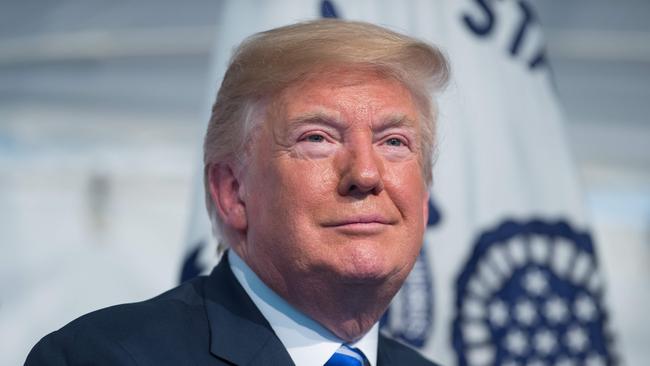G7 nations turn on Trump, slam tariffs as threat to free trade
Donald Trump has been accused by America’s closest allies of undermining the global trading system.

Donald Trump has been accused by America’s closest allies of undermining the global trading system and risking a historic split between the US and the rest of the world on trade.
In an unprecedented joint rebuke of the Trump administration’s decision to slap tariffs on its key allies, the Group of Seven industrialised nations has slammed Washington for jeopardising a generational shift towards free trade.
Finance ministers for the G7 in Canada yesterday warned that “collaboration and co-operation has been put at risk by (US) trade actions against other members”.
It was the first warning by the G7 against a member nation and highlights the anger felt by key US allies, especially Canada, Europe and Mexico, over last’s week’s decision by the White House to levy tariffs on their steel and aluminium exports to the US. The move is part of Mr Trump’s “America First” push to punish countries with an unequal trade balance with the US, but was seen by the West as undermining global free trade.
G7 finance ministers, meeting ahead of the G7 leaders’ summit in Quebec this week, issued a joint statement expressing their “unanimous concern and disappointment” with the tariff decision. The statement suggests Mr Trump will receive a hostile reception at the leaders’ summit.
Former Business Council of Australia president Tony Shepherd doubted there would be a big impact on Australia from the tariffs themselves but said a global trade war was a risk.
“Our relationship with the US is as strong as ever, underpinned by our defence alliance and great diplomatic work,” he said. “However, a global trade war is a risk to Australia, given our heavy reliance on commodity trade to North Asia.”
Foreign Minister Julie Bishop said the Turnbull government welcomed US confirmation that Australian exports would not be subject to tariffs. “This reflects the fair and open trade relationship Australia shares with the US,” she said. “Australia is not a source of trans-shipped steel and aluminium and we keep track of imports and exports. The Turnbull government will continue working with the US and our other trading partners to prevent practices such as dumping and transhipment.”
Mr Trump announced late last week that he would not grant exceptions to Canada, Mexico and Europe for 25 per cent tariffs on steel and 10 per cent tariffs on aluminium. The decision contrasted with exceptions granted to Australia, Argentina and Brazil. Australia was also the only country not to be hit with new US quota restrictions on steel and aluminium exports to the US. But the tariff decision sparked fury in Canada, Mexico and the EU, with each threatening like-for-like sanctions worth tens of billions of dollars. The issue threatens to spiral into a global trade war.
After meeting G7 finance ministers yesterday, US Treasury Secretary Steve Mnuchen tried to play down the rift, but acknowledged there was a problem. He said “there was clearly a consensus from the rest of them” on the US tariff decision. But he also said: “There were many, many areas, not only do we agree on, we’re completely united on.”
The new US tariffs on steel and aluminium were originally aimed at China, which has flooded the world market with cheap steel. But after months of deliberation Mr Trump chose to levy the tariffs on all major US importers of steel, arguing that he needed to safeguard local production for the sake of national security.
“Our absolute view is that this is absurd to think that Canada could in any way be a security risk to the US,” Canadian Finance Minister Bill Morneau said.
The statement issued by six G7 nations, excluding the US, admitted the divisions with the US, saying the leaders’ meeting “should be to restore collaborative partnerships to promote free, fair, predictable and mutually beneficial trade”.
But Mr Trump was unrepentant, saying China and other countries had been ripping off the US for years.
“When you’re almost 800 billion dollars a year down on trade, you can’t afford to lose a Trade War! The US has ben ripped off by other trade countries for years on Trade. Time to get smart,” he tweeted.
German Finance Minister Olaf Schultz described the US decision as a “very severe problem”. “No one understands that due to security reasons there should be extra tariffs on steel and aluminium,” he said.
Australian Industry Group chief executive Innes Willox has expressed concern the tariffs will affect local exporters because there was potential to “knock confidence out of global trade”.
“The steel tariffs will have an impact on Australia, and part of the problem here is what we’re seeing out of the US is some fairly inconsistent policy, some things happening one day and then the opposite happening the next,” Mr Willox told Sky News.
Additional reporting: Paige Taylor
Cameron Stewart is also US contributor for Sky News Australia.


